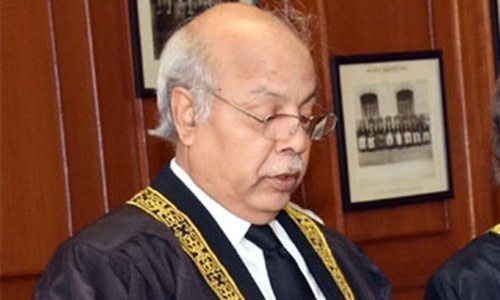The Supreme Court on Monday directed the federal and provincial governments to devise a joint policy to tackle the ongoing coronavirus crisis in the country and submit a report on it within a week.
The directions were issued during a hearing of a suo motu case regarding measures taken to tackle the pandemic. A five-member bench of the Supreme Court, headed by Chief Justice Gulzar Ahmed, heard the case.
The bench further told the governments to present their arguments over the provinces' interference in federal affairs in the next hearing. The court will issue a decision after hearing the arguments.
During today's hearing, the bench raised questions over the coordination between the federal and provincial governments.
"How can provincial governments block the federal government's source of revenue?" asked the top judge. He was addressing the Sindh Advocate General Salman Talibuddin.
Justice Umar Ata Bandial, who was part of the bench, said that the steps taken by the provincial government should "have the approval of the Centre".
Talibuddin told the court that the Sindh government had imposed a lockdown under a law passed in 2014.
"The authority of the provincial government is only limited to what is dictated by the Constitution," said Justice Ahmed.
"Federal government collects the tax [generated by] business activities. How can provinces restrict them?
"The reasons behind the lack of cooperation between the federal government and provinces are pride and ego," Justice Bandial remarked, adding: "A week's time is being granted to formulate a joint policy with regards to corona. If a joint policy is not devised, an interim order will be issued."
He said that all governments "should sit together and talk". "It seems like all executives have failed," he commented.
"We recovered from floods and earthquakes. We will come out of this problem as well. But the issue is the conceited behaviour of the people sitting in the Centre.
"Government matters cannot be run by ego and stubbornness."
Attorney General Khalid Jawed Khan, who also appeared before the court, said that the federal government wanted to "solve matters through mutual understanding".
"We don't want matters to go to an extent where the court has to intervene," he said.
Commenting on the political climate of the country, the attorney general said: "It would be better if the court let politicians handle political matters. Parliament is the best forum to debate over federal government's authority."
The chief justice said that the court will "not get involved in any political matter".
"Is it not our constitutional responsibility to inquire about the deaths of citizens?" Justice Qazi Mohammad Ameen asked.
The attorney general assured the court that the country was sufficient in resources to deal with coronavirus crisis.
"Have a look at the price at which the people are getting access to facilities [...] standing in queues to get ration bags."
The Centre and Sindh government have been in disagreement over measures to curb the spread of Covid-19 that has infected more than 20,000 people across the country. Sindh has insisted on imposing a blanket lockdown to control the spread. The federal government, on the other hand, has insisted that the country cannot afford to shut down economic activities and has ordered the reopening of some industries, including construction.
The court, in today's hearing, also noted that while the government has allowed prayer congregations to resume in mosques, shops have remained shuttered.
"Won't coronavirus spread through mosques?" Justice Sajjad Ali Shah, who is a member of the bench, asked. "Regulations are not being followed in 90 per cent of the mosques. If [social] distance has to be maintained, it should be done everywhere. Where is the policy?"
The chief justice said that all industries should be allowed to operate after formulating a "strong policy".
The SC also directed that all clinics in Peshawar be opened according to the standard operating procedures (SOPs) outlined by the government.
"The situation in Khyber Pakhtunkhwa is not good," the CJP remarked, adding that there was an increase in the province's death rate.
"Doctors are going to hotels to examine patients," remarked Justice Sajjad Ali Shah, adding that those clinics that were operating without implementing SOPs will not be allowed to open.
He also took notice of recent reports of police brutality on doctors in the province. "KP is the only province where doctors have been made to bleed [at the hands of police]," he said.
"The health secretary is not a doctor, that is why the standard of health in the province is like this," he said.














































